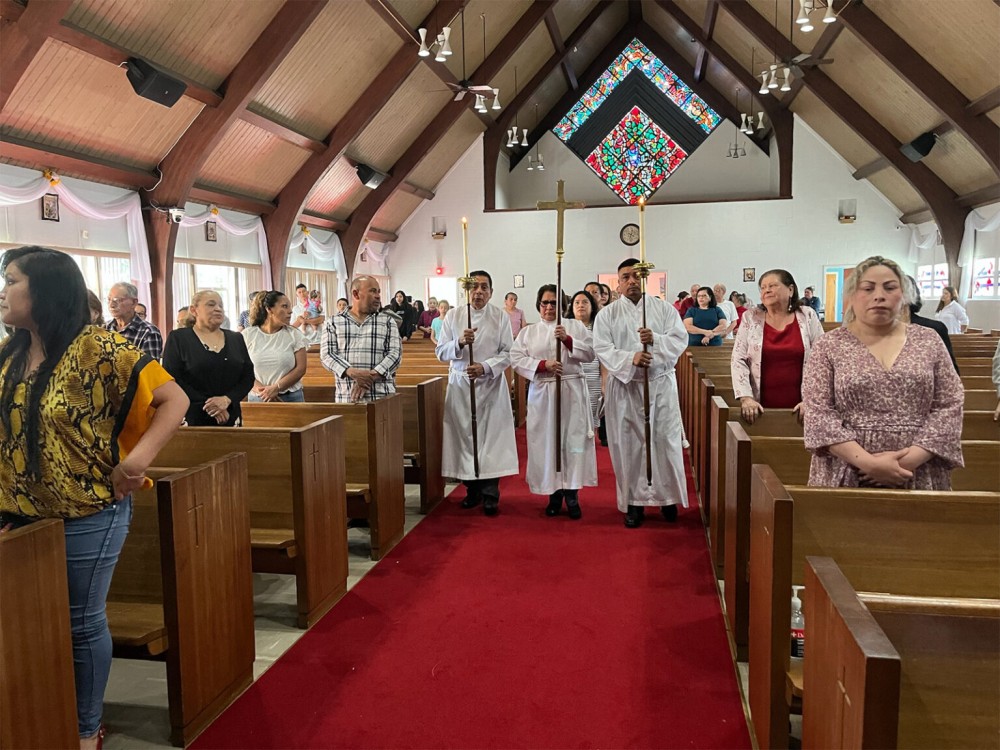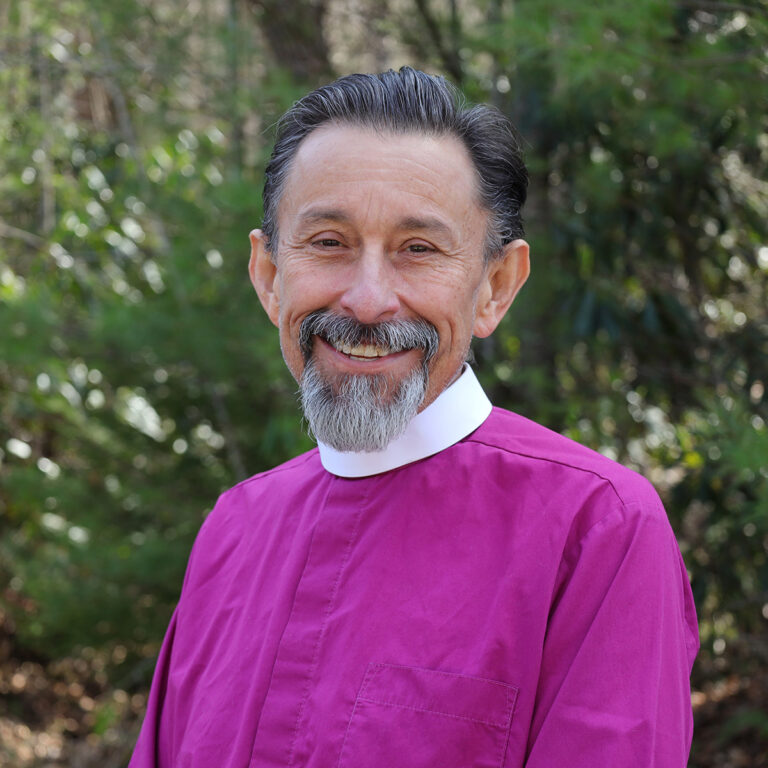Latino Episcopalians in the spotlight with Gutiérrez presiding bishop nomination

Acolytes lead the procession at San Mateo Episcopal Church in Hyattsville, Maryland, on May 19. (RNS photo/Aleja Hertzler-McCain)
Six years ago, during the keynote address at the 2018 Nuevo Amanecer conference in Hendersonville, North Carolina, Episocpal Bishop Daniel G.P. Gutiérrez of the Diocese of Pennsylvania told an audience of Latino Episcopalians: “We are not an outreach project. We are the church.”
Today, Gutiérrez is one of five nominees to succeed Presiding Bishop Michael Curry. If elected on June 26 at the general convention, Gutiérrez could become the highest-profile Latino leader of a US religious group.
According to a 2014 Pew study, the Episcopal Church is among the least racially diverse religious groups in the US, with White people making up 90 percent of the denomination. In 2014, only 2 percent of the denomination was Latino.
That number has likely changed in the ensuing decade, especially with the Catholic Church experiencing steep losses in membership. Sixty-five percent of US Latinos, Gutiérrez among them, were raised Catholic. But 23 percent now identify as former Catholics. Only 9 percent of US Latinos report switching to Protestantism; twenty percent of US Latinos who have left their childhood religion become unaffiliated, according to 2022 Pew data.
Regardless of the big-picture numbers, Latino Episcopal clergy say their congregations are thriving.
In Hyattsville, Maryland, where a scratchy güira provided a cumbia beat to energetic worship music, about 400 people attended three different Spanish services on Pentecost Sunday at St. Matthew’s/San Mateo Episcopal Church.
Vidal Rivas, senior priest at San Mateo, said that while the congregation has yet to reach pre-pandemic Sunday attendance, the more than 1,000 registered parishioners keep the church “very alive, very strong.”
In an interview, Rivas said that San Mateo emphasizes solidarity, regularly hosting several-dozen newly arrived immigrants in the church’s basement, participating in marches for immigrant rights, and fighting for rent stabilization.

Bishop Daniel G.P. Gutiérrez of the Episcopal Diocese of Pennsylvania. (Courtesty photo)
Rivas’s wife, Angela, who matches his intensity for ministry, said her husband’s dedication to meeting people’s needs and his openness have played a key role in San Mateo’s growth. “It doesn’t matter to him if they come to him from other churches for funerals. He preaches anyway and from there people stay.”
Santiago “Santi” Rodriguez, associate rector at Grace Episcopal Church in Alexandria, Virginia, said Latinos often find the Episcopal Church when they reach out, “not fully understanding what that church was,” for help with a baptism, funeral, or material need.
“And then they were welcomed, they were cared for, they were loved, and then in time, they were invited to participate in a service as part of the larger community, and they felt right at home,” Rodriguez said.
Rodriguez, a former Jesuit, said Latinos also find the church when they are looking for “more inclusive, intentionally affirming communities.”
“They felt they needed to be affirmed, to hear that they are God’s beloved children, that they are loved and accepted as they are, and they are always challenged to grow in their faith and to seek a relationship with Jesus and to be affirmed by the power of the Holy Spirit,” said Rodriguez.
Angela Rivas, who, like many other Latinos interviewed, had previously been Catholic, said she liked becoming an Episcopalian because “they let you be yourself with your shortcomings. They don’t prohibit you from communion,” adding that she also finds that she has more opportunities to work for the church. (Only 21 percent of Hispanic Catholics receive communion at every mass they attend, according to a 2015 Pew survey.)
The main reason unaffiliated Latinos give for leaving their faith, according to a 2023 PRRI survey, was no longer believing the religion’s teachings—but nearly the same number (58 percent) cited “negative teaching about or treatment of gay and lesbian people.”
For Yuriria “Yuri” Rodriguez, currently serving at the Church of the Nativity in Indianapolis, becoming an Episcopalian “brought an empowerment that I did not experience when I was a child.”
Coming to interview at an Episcopal church for a director of music position without much prior knowledge of the church, she saw a woman preaching and a Pride flag outside the church. Rodriguez said, “I thought, ‘This is my place. I’ve always wanted to be in a place like this.’” (Yuri and Santi Rodriguez are not related.)
Alejandra “Ale” Trillos, the rector of Saint Paul San Pablo Episcopal Church in Salinas, California, said that, having studied political science before her ordination, the Episcopal Church’s transparency about money and its election of bishops impressed her.
Rivas, who began his ministry as a Catholic priest in El Salvador, became an Episcopal priest after a dispute with former Washington Cardinal Theodore McCarrick, who later became the first Catholic cardinal laicized for the sexual abuse of children and adults.
Rivas said McCarrick had accused him of being “like a communist” and tried to transfer him back to El Salvador, which Rivas had left after facing targeted violent assaults. At the time, the archdiocese told the Washington Post that the transfer was routine.
Determined to continue serving DC’s Salvadoran community, who rallied behind him by protesting outside the archdiocesan offices and organizing letter-writing campaigns, Rivas left the Catholic church, underwent the process of becoming an Episcopal priest, and married Angela.
Yet, despite finding a home in the Episcopal Church, Latino clergy said there are multiple barriers to full participation and belonging. For Trillos, a major barrier to ordination was finding financial aid, because, as an immigrant from Colombia, she was an international student.
Trillos and Rivas also said their communities struggle with a lack of resources.
Even as San Mateo hosted dozens of immigrants and hundreds of parishioners at once, the church initially only had two toilets. Because of San Mateo’s immigration work, an ecumenical group of churches pitched in to add four more toilets and bathing facilities to the bathrooms.
Rivas also spoke of facing hostility from English-speaking communities, explaining that he began ministry at San Mateo after the growth of Latino communities at two previous churches was seen as “a threat.”
“What (San Mateo is) doing is always extraordinary,” Washington Bishop Mariann Edgar Budde, said. “They have been one of the stalwarts in providing the first stop in respite and support” for newly arrived immigrants.
Budde expressed regret that, while the diocese has been subsidizing the congregation as it moves towards self-sufficiency, it was unable to help financially with the bathroom renovations.
While historically the English and Spanish-speaking communities at Saint Paul San Pablo had not communicated, Trillos said the communities have now made a commitment to become one, hiring her for her bicultural skills and hosting several bilingual services a year.
Trillos said a major challenge for Latino Episcopalians is that “unfortunately we have very few vocations” to meet the needs of the community.
Yuri Rodriguez said many of the Episcopal Church’s Latino ministries, which first began in 1970, were founded as missions, “a concept with a power dynamic.”
“The power dynamic is that those who have the resources are in charge, and those who receive the resources or have the need are very passive,” said Rodriguez, who explained that the power dynamic creates inequality.
At San Mateo, where parishioners spoke highly of their own community’s welcoming and helping spirit, community members were not aware of Gutiérrez’s nomination, although they expressed excitement at the idea of having national leadership that represented them.
Yuri Rodriguez said that “Latinos are not fully participant right now of all the polity of the Episcopal church,” because the current system “keeps the knowledge and the education and the formation at the margins for Latinos.”
She said the next frontier for Latino ministries in the Episcopal Church, which she described as still “an elitist church,” is creating more unity and identification with the broader church.
Gutiérrez and Anthony Guillén, the Episcopal Church’s director of ethnic ministries and missioner for Latino/Hispanic ministries, declined to comment for this article through their representatives. Amanda Skofstad, the church’s senior public affairs officer, said the denomination could not comment on stories related to the election and that candidates had agreed not to give media interviews.
For Santi Rodriguez, Curry’s leadership of the church, as a Black man, brought a lived experience that has allowed him “to lovingly name some of the areas in which we as a church have to grow.”
In the future, Rodriguez said, “I hope that we’ll continue to be intentional, to welcome Latinos and people of color, because we need their gifts and their voices and their talents and for them to be partners in discernment, collaboration, and ministry.” —Religion News Service




